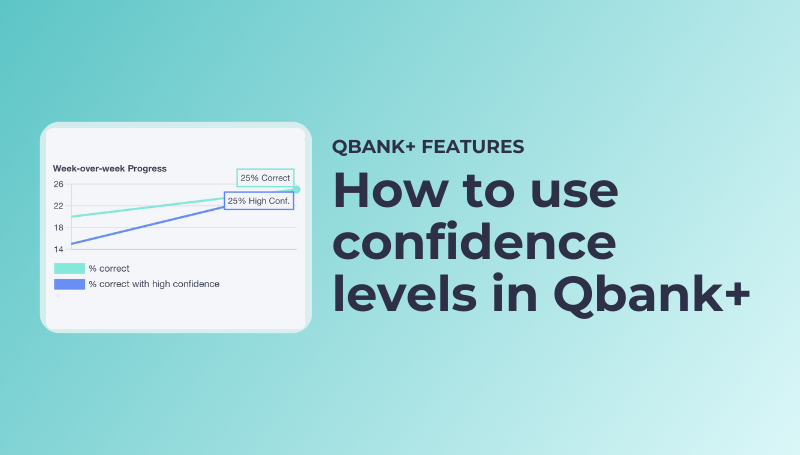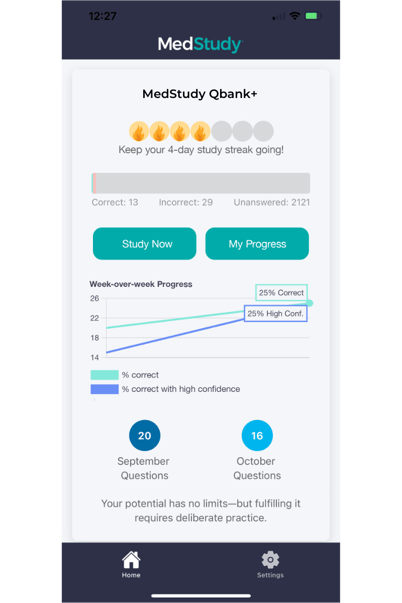Mastering Medicine: How Confidence Levels in Qbank+ Help You Study More Efficiently

Key takeaways:
- Using metacognition in your learning journey—not just in your practice—is key to becoming more efficient with your study time.
- Metacognition helps you reflect on your clinical knowledge, thinking patterns and decision-making processes, leading you to be aware of where you might be falling short. Tackling those gaps leads to more accurate diagnoses, effective treatment plans, and more correct answers on board questions.
- MedStudy's Qbank+ has a 'confidence levels' feature that allows you to choose a confidence level after your Q&A answer option. Reflecting on your confidence begins the metacognitive process, and at the end of Qbank+ sessions you'll see a confidence report that breaks down your confidence level during that session.
- Over time the number of Q&As you have marked as low confidence, high confidence but answered incorrectly, or bookmarked will decrease as your knowledge and confidence grows.
The cornerstone of becoming a competent and confident physician is learning to distinguish between what you know and don’t know. This is the process of metacognition! Using metacognition in your learning journey—not just in your practice—is key to becoming more efficient with your study time.
In this blog, we discuss how to use metacognition to be more efficient in learning medicine, and show you how to master medical concepts using metacognition and qbanks.
The importance of metacognition in learning medicine
Metacognition—when applied to learning—is thought of as an honest reflection of what you know and don’t know. It's critical to being a competent physician and studying for the boards.
Practicing medicine involves complex decision-making and problem-solving, and metacognition helps you reflect on your clinical knowledge, thinking patterns and decision-making processes, leading you to be aware of where you might be falling short. Tackling those gaps leads to more accurate diagnoses, effective treatment plans, and more correct answers on board questions.
This introspection goes beyond just acquiring knowledge—it involves analyzing, evaluating, and planning your approach to learning.
How Qbank+ sets you up for study success
Often, doctors are using qbanks to assess their knowledge. However, Q&As are actually much more powerful when used throughout the entire learning process! Q&As help you compare and contrast information and move this refined, more-detailed knowledge into long-term memory.
Each MedStudy Qbank+ question is a learning event in itself—it presents a clinical scenario, questions on the clinical scenario, distractors, the correct answer, a confidence level prompt, and then the explanation details why the correct answer is correct, and in which case the rest of the answer options would be correct.
How confidence levels work in Qbank+
In Study Mode, after you select an answer for the question you rate your confidence in that answer. This engages the metacognitive feedback process. After choosing a confidence level, you’ll immediately see whether the selected answer is correct or incorrect—and you’ll be able to assess if your confidence was on-target. This concludes the metacognitive process for this question!
.png?width=800&height=455&name=The%20ABIM%20MOC%20Exam%20Dates%20and%20Details%20You%20Need%20to%20Know%20(10).png)
An example of choosing confidence levels in Qbank+
At the end of the Qbank+ session, you’ll see reports based on your answers. This gives you a clear view of, overall, how on-target your confidence matches your actual knowledge of the material tested. Developing this metacognitive faculty is critically important because it leads to increased competence in your practice.
With confidence levels, you’ll be able to see two things at-a-glance:
- You begin to understand what material you just happened to answer correctly, but are not fully confident in your knowledge
- You begin to understand which concepts you have high confidence in—and whether you are answering correctly or incorrectly
You’ll be able to go back to the questions you have low confidence in—because whether you answer them right or wrong is irrelevant. You don't really know that material yet. Without a confidence level to bring you that insight, you might’ve answered that question correctly once and just assumed you knew the concept because you happened to answer correctly.
You’ll also be able to see areas where you have high confidence, but you answered the question incorrectly.
Pro tip: If you’re down to two answers at the end of a Q&A, you most likely just don't know the material well enough. You don’t have a fine enough discrimination between the similar topics in their knowledge base. You should bookmark these questions to come back to again!
This work we’ve done to help you with metacognition while you’re learning will absolutely make you more efficient and effective while you study—you learn better and better on what topics to focus. Doing this practice over time gives you confidence in what you know, leading to more competent patient care.
The ideal way to use confidence levels
You may think you know everything in your specialty—you’ve seen it all over the course of 5+ years in practice. Or maybe you’re a medical student just starting out. Maybe you know a lot more than you think you do! Up until now, there hasn’t been a metacognitive process built into learning materials, so the data about your confidence matching your knowledge hasn’t been available to you—you’re basing your confidence in topics more off a gut feeling.
 Dr. Hannaman’s prescribed method for using confidence levels
Dr. Hannaman’s prescribed method for using confidence levels
On your first pass through Qbank+, add your confidence level for every single question. If you feel stumped by a question, choose your confidence level and also bookmark it for later. This gives you two feedback loops for your future qbank sessions: confidence level and bookmarked questions.
By the time you get through all of the Q&As, you’ll have a number of Q&As tagged ‘low confidence’ or bookmarked. You’ll know exactly where to spend your study time!
As you go through the questions a few times, keep adding your confidence level. Over time, the number of Q&As you have marked as low confidence, high confidence but answered incorrectly, or bookmarked will decrease as your knowledge and confidence grows.
 The MedStudy mobile app shows how confidence levels and correct answers change over time.
The MedStudy mobile app shows how confidence levels and correct answers change over time.
When to turn confidence levels feature off
Confidence levels do add a step to answering Q&As in Study Mode. On your final go-through of Q&As before your exam, turn this feature off in your account preferences. You should be confident in the assessment of your knowledge by this point! Your settings for confidence levels will carry into your mobile app session setup, too.
You won’t see Confidence Levels in Test Mode because it creates a simulated exam.
Incorporating metacognition into your learning process is not just about enhancing your knowledge base—it's about evolving as a more competent, reflective, and adaptable physician. As you prepare for your boards, remember that the key to mastering medicine lies as much in understanding how you learn as it does in what you learn.


